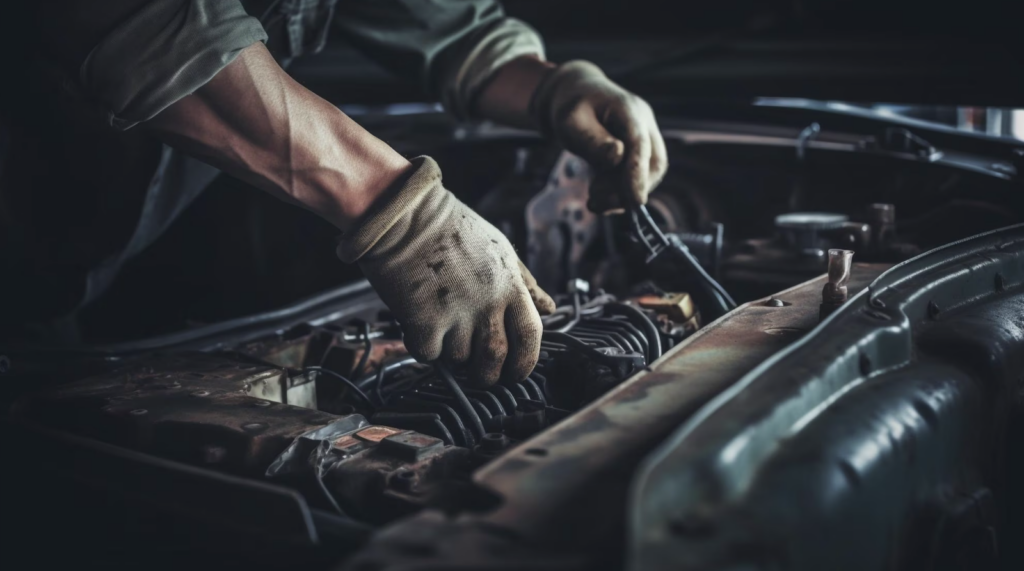Have you ever experienced the unsettling sound of your car making a rattling noise when you turn it on? It can be quite concerning and leave you wondering about the potential issues that might be lurking beneath the hood. Fear not, for we’re here to shed light on the matter. In this comprehensive guide, we’ll delve into the various reasons why your car might be emitting such a noise and what you can do to address it. Whether you’re a seasoned car enthusiast or a new driver, understanding the root causes of these sounds can empower you to take informed actions and ensure the smooth functioning of your vehicle.
Common Causes of Rattling Noise When Starting Your Car
As you prepare to embark on your journey, the last thing you want to encounter is an unexpected noise emanating from your vehicle. Let’s explore some of the common reasons behind the mysterious rattling noise that accompanies the act of starting your car. Understanding these causes will help you grasp the underlying issues and take the necessary steps to resolve them.
- Loose or Damaged Belts: One of the most common culprits for rattling noises upon starting your car is loose or damaged belts. The drive belt or serpentine belt might be loose, worn, or damaged, causing a rattling sound as the engine revs up. Regular maintenance and timely belt replacements can help prevent this issue;
- Exhaust System Issues: A rattling noise during start-up could also be attributed to problems within the exhaust system. Loose or broken components, such as the heat shields, catalytic converter, or exhaust pipes, can vibrate and create a rattling sound. Inspecting the exhaust system for any visible damage can help identify the issue;
- Engine Mounts: Worn-out or damaged engine mounts can result in the engine moving excessively during start-up, leading to a rattling noise. This noise might be more noticeable when the car is shifted from park to drive or reverse. Replacing faulty engine mounts can resolve this issue;
- Starter Motor Issues: If the starter motor is not engaging properly, it can result in a grinding or rattling noise when you attempt to start the car. The starter gear might not be properly aligned with the flywheel, causing the noise. Consulting a mechanic to diagnose and repair starter motor problems is essential
- AC Compressor Clutch: When the air conditioning system is turned on, the AC compressor clutch engages. If the clutch is worn or damaged, it can create a rattling noise when the AC is activated. A professional inspection can determine if the AC compressor clutch needs replacement.
Unveiling Solutions: Steps to Address the Issue

The enigma of a rattling noise when starting your car demands not just an understanding of the root causes, but also a blueprint for effective solutions. Fortunately, you don’t need to be an automotive expert to navigate through this challenge. By following a systematic approach and seeking the right guidance, you can put an end to those unsettling noises and restore tranquility to your driving experience. In this section, we’ll outline the steps you can take to identify and address the issue, ensuring that your car’s performance remains reliable and smooth.
- Visual Inspection: Start by conducting a visual inspection under the hood. Look for any loose or visibly damaged components, such as belts, heat shields, or exhaust parts. If you’re not comfortable performing this inspection, consult a mechanic;
- Check Engine Mounts: If you suspect engine mounts might be causing the rattling noise, have a mechanic inspect them. They can assess the condition of the mounts and replace them if necessary;
- Exhaust System Inspection: A mechanic can inspect the exhaust system for any loose or damaged parts. They can tighten or replace components as needed;
- Starter Motor Examination: If the starter motor is suspected, a professional diagnosis is essential. They can determine if the starter motor needs repair or replacement;
- Regular Maintenance: Preventive maintenance, such as regular belt checks and replacements, can help prevent rattling noises caused by loose or worn belts.
When to Seek Professional Assistance: Safeguarding Your Vehicle’s Well-Being

While gaining insights into the root causes and potential resolutions of a rattling noise in your car is undoubtedly advantageous, there come instances when the wisdom of a professional mechanic or automotive technician becomes indispensable. Recognizing the appropriate juncture to turn to a seasoned expert can save you not only time and money but also avert the risk of exacerbating the issue. In this segment, we’ll delve deeper into the art of identifying those distinct red flags that unmistakably signal the need for professional intervention.
Navigating Complex Engine Quandaries
When confronted with a perplexing rattling noise that seems inextricably linked to intricate engine components, entrusting the challenge to a qualified professional is the prudent course of action. The modern internal combustion engine is a symphony of intricately synchronized parts, each playing its role in harmony. A skilled mechanic’s trained eye and diagnostic equipment are instrumental in swiftly uncovering the exact source of the noise. Whether it’s a worn-out belt, a misaligned pulley, or a glitch in the engine’s inner workings, a professional’s expertise ensures that the root cause is accurately identified and effectively addressed.
Harnessing Diagnostic Expertise
The contemporary automotive landscape is graced with vehicles that boast advanced computerized systems capable of detecting and deciphering various malfunctions. When grappling with a rattling noise possibly tied to these sophisticated electronics, the counsel of a professional is invaluable. Automotive technicians are equipped with specialized tools and know-how to interface with these intricate computer systems. Extracting invaluable diagnostic insights that may elude the untrained eye, they can expedite the troubleshooting process and formulate a targeted solution.
Upholding Warranty and Resale Value
For those fortunate enough to still be within the warranty period, seeking professional assistance is not merely a suggestion; it’s often a stipulation. The allure of DIY repairs or the temptation to enlist the help of well-meaning acquaintances may lead to unintended consequences. If your vehicle’s warranty is still in effect, taking matters into your own hands could potentially void it, leaving you vulnerable to significant financial repercussions should a major issue arise. Entrusting your car to certified professionals ensures that any repairs are conducted in accordance with the manufacturer’s specifications, thus safeguarding your warranty and the potential resale value of your vehicle.
In the realm of automobile maintenance and repair, discerning when to seek professional help can be a game-changer. The allure of DIY endeavors is understandable, but the intricate anatomy of modern vehicles often necessitates the seasoned hands of trained mechanics and technicians. When confronted with a persistent and elusive rattling noise, consider it a resounding call to engage the professionals. In doing so, you’re not only tackling the immediate concern but also championing the prolonged well-being and optimal performance of your cherished vehicle.
Conclusion: Resolving the Rattling Riddle
In the intricate symphony of mechanical marvels that constitutes your car’s inner workings, a rattling noise during startup can be a perplexing note. Our exploration into the potential culprits has unveiled an array of possibilities, from the rhythmic dance of loose belts to the harmonious hum of a misbehaving AC compressor clutch. These auditory cues are not to be taken lightly, for they often whisper of underlying issues that, if ignored, could crescendo into more substantial problems down the road.
As we’ve seen, diagnosing the exact source of the rattle requires a blend of keen observation, basic mechanical prowess, and a dash of patience. Armed with knowledge, you’re equipped to venture under the hood, beneath the chassis, or within the intricate realms of your car’s systems to decipher the enigma. However, if deciphering this automotive riddle feels daunting or exceeds your comfort zone, know that professional help is but a phone call away.
A seasoned mechanic’s experienced touch is not merely an alternative; it’s an investment in your car’s lasting health. Entrusting the puzzle to their hands guarantees a precise diagnosis and targeted solution, sparing you the uncertainties of trial and error. Timely intervention not only preserves your vehicle’s performance but also alleviates the anxiety that often accompanies mysterious noises.
In the end, whether you choose the path of a DIY detective or opt for the seasoned guidance of a professional, one thing is clear: action is key. Ignoring a rattling noise, however innocuous it may seem, is akin to silencing an orchestra that’s about to strike a discordant note. The composition of your car’s journey is enriched when you choose to listen, to investigate, and to address these auditory cues with promptness and precision.
With each turn of the key, your car embarks on a symphonic journey, powered by the harmonious interplay of countless components. When an unfamiliar rattle joins this ensemble, your role transforms from a mere driver to a vigilant conductor of your vehicle’s well-being. Whether you’re deciphering the chime of a misaligned belt or orchestrating a visit to the mechanic’s domain, remember that every sound has a story, and every solution is a note towards preserving the harmony of motion that your car represents.
